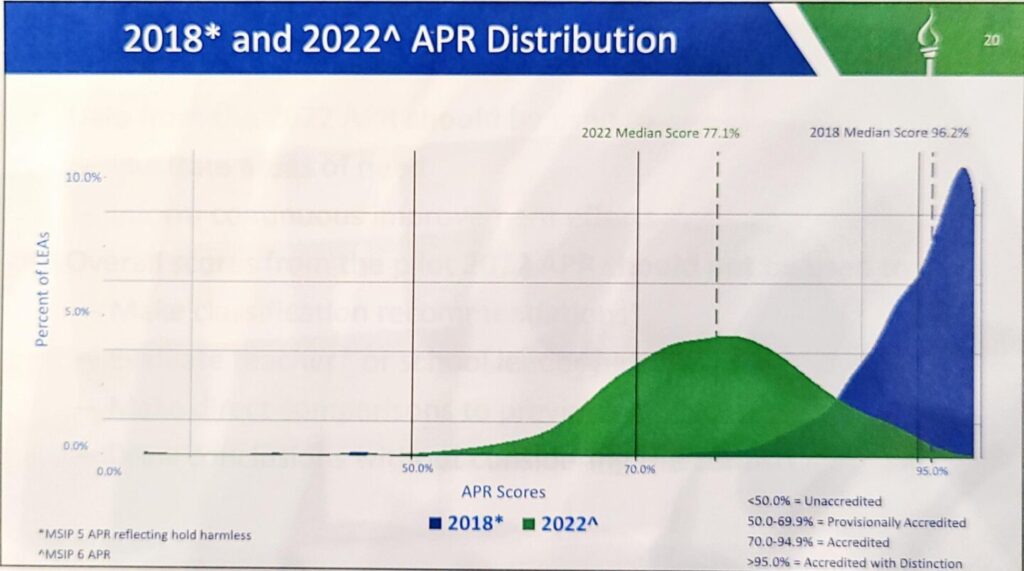(The Lion) — Missouri assessment test results from 2021-22 were released Tuesday, revealing breathtaking performance drops leaving more than 100 school districts short of the full accreditation mark.
The Department of Elementary and Secondary Education (DESE), which releases the annual report as part of its “Missouri School Improvement Program,” says it won’t make any accreditation changes for three years, since this year’s results reflect “a new system with different scoring.”
But when compared to the last annual report – from 2018 – the average score statewide dropped from 90% to just 65%.
DESE’s website claims it’s “inaccurate” to compare the latest results with previous ones, but the department itself released a chart showing how district scores changed during the five-year span.

According to the chart, the statewide median score fell from 96.2% in 2018 to 77.1% in 2022, with around 20% of districts now falling below the 70% mark and into the “provisionally accredited” category.
Comments from DESE Commissioner Margie Vandeven seemed to imply the comparison of scores is accurate enough to reveal the urgent need for improvement.
“What you will see in our data is that many of our systems are stressed and it will take us all working together to meet our vision of improving lives through education,” she said in a press conference Tuesday.
The decline comes after millions of dollars in COVID relief money poured into schools, an impact which Vandeven reportedly said is too early to be measurable.
The Lion asked two state lawmakers about the drop in scores and possible remedies.
“This data bears out other indicators we’ve seen on the learning loss suffered during the shutdowns of 2020 and 2021,” Rep. Josh Hurlbert, R-Smithville, told The Lion. “It also shows that almost 20% of our school districts are at risk of only being provisionally accredited within the next few years.”
Hurlbert’s district includes Smithville R-II, which fell from 99.6% in 2018 to 91.3% in 2022, and East Buchanan C-1, which fell from 86.3% to 79.4% in the same span, both well above the 70% full accreditation threshold.
Rep. Brenda Shields, R-St. Joseph, reiterated DESE’s statement that this year’s scoring is a “pilot year.”
“It’s not entirely accurate to say this is a ‘drop’ in scores since the new MSIP6 is very different than the previous MSIP5,” Shields wrote in an email to The Lion. “The new scores show a wide range of distribution which recognizes high performing schools while at the same time providing guidance as to how districts can improve their scores before classification is impacted in the third year of implementation.”
The St. Joseph School District saw its overall score drop almost 25%, from 91.2% in 2018 to 67.6% in 2022.
When asked about the impact of spending on education outcomes, Shields seemed optimistic that more spending would improve scores.
“If you look at national data, it shows that states that have higher levels of average per pupil spending perform better on national assessments,” Shields said, acknowledging the need to be “thoughtful” in education funding. “So clearly there is a correlation between spending and achievement.”
However, policy experts disagree with Shields’ opinion that more government spending will lead to better outcomes, pointing to the failures of enormous spending efforts to close achievement gaps.
“In Missouri, like most places, spending on public education only goes up,” writes Susan Pendergrass, director of education policy for the Show-Me Institute and author of a new report on DESE’s budget. “The machine that administers the state’s effort costs almost $200 million per year to run. Five billion in revenue collected by the state from Missouri taxpayers is distributed back to school districts to try to even the playing field between wealthy and poor communities.
“And yet, we have very little to show for it in terms of improvement in overall academic achievement or improvement in reducing gaps between student groups.”
Instead of spending, Hurlbert emphasized the importance of innovation and choice in education:
“We need to innovate and continue to empower parents with options so that they can find the best education for their children regardless of their zip code or income.”

